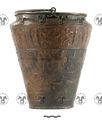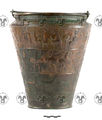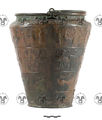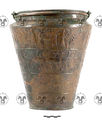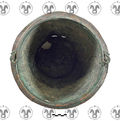HU-7 situla: Difference between revisions
Gudrun Bajc (talk | contribs) No edit summary |
No edit summary |
||
| Line 2: | Line 2: | ||
|name=Situla in Providence | |name=Situla in Providence | ||
|type_object=vessel | |type_object=vessel | ||
|type= | |type=situla | ||
|material=bronze | |material=bronze | ||
|dimension=height: 26.6 cm, rim diameter: 21 cm, maximum diameter: 23.6 cm, base diameter: 13 cm | |dimension=height: 26.6 cm, rim diameter: 21 cm, maximum diameter: 23.6 cm, base diameter: 13 cm | ||
| Line 8: | Line 8: | ||
|condition=restored | |condition=restored | ||
|culture_archaeological=Hallstatt | |culture_archaeological=Hallstatt | ||
|sortdate=- | |sortdate=-537 | ||
|date= | |date=third quarter of the 6<sup>th</sup> century BC | ||
|date_derivation=typology | |date_derivation=typology | ||
|site=unknown | |site=unknown | ||
| Line 16: | Line 16: | ||
|location=Rhode Island School of Design Museum | |location=Rhode Island School of Design Museum | ||
|inventory_number=Mary B. Jackson Fund 32.245 | |inventory_number=Mary B. Jackson Fund 32.245 | ||
|checklevel=0 | |||
|checklevel= | |||
}} | }} | ||
==Commentary== | ==Commentary== | ||
Published in {{bib|Frey 1962}}: 1–57. | |||
Images in {{bib|Frey 1962}}: pl. 1–3 (photos), {{bib|Marchesini & Zaghetto 2019}}: figs 1 and 2 (drawings of the decoration), [http://risdmuseum.org/art_design/objects/95_pail_situla museum website] (photos of the restored situla). | |||
The situla was retrieved from the Italian art trade. In the [[index::Rhode Island School of Design Museum|RISD museum's]] announcement of the situla in 1934, the Etruscan necropolis at the | |||
Certosa di Bologna was given as find place, but the reliability of this statement was already qualified by {{bib|Frey 1962}}: 1. The fact that a similar object – the Situla Certosa – was found there can either support the claim or challenge it, in that it makes the necropolis a plausible find place for a seller to make up for a decorated situla (cf. {{bib|Frey 1962}}: 59). | |||
In any case, the object can be dated to the third quarter of the 6<sup>th</sup> century on typological grounds ({{bib|Frey 1962}}: 46; Zaghetto in {{bib|Marchesini & Zaghetto 2019}}: 329), making it the oldest inscribed object in the Raetic corpus (disregarding [[index::BZ-17 axe]] with a non-alphabetic mark). The [https://risdmuseum.org/art_design/objects/95_pail_situla museum’s website] is even more specific, giving a dating of 530–525 BC. | |||
Lucke (in {{bib|Frey 1962}}) places the situla in the context of others from the area of the Eastern Alps and Northern Italy and assumes that it was manufactured by "Illyrians" in the valley of the Adige rather than in the south (p. 51), but Frey argues for locating a non-Etruscan workshop near Bologna (p. 57). Zaghetto ({{bib|Marchesini & Zaghetto 2019}}: 329) agrees with Lucke on an "Alpine or Pre-Alpine" origin, while the [http://risdmuseum.org/art_design/objects/95_pail_situla museum] calls the object Etruscan. | |||
See Zaghetto in {{bib|Marchesini & Zaghetto 2019}}: 329 for a detailed description and study of the situla's decorative programme. | |||
{{bibliography}} | {{bibliography}} | ||
Revision as of 01:13, 17 March 2020
| Object | |
|---|---|
| Proper name: | Situla in Providence |
| Classification: | vessel |
| Archaeological type: | situla |
| Material: | bronze |
| Size: | height: 26.6 cm, rim diameter: 21 cm, maximum diameter: 23.6 cm, base diameter: 13 cm |
| Condition: | restored |
| Archaeological culture: | Hallstatt |
| Date: | third quarter of the 6th century BC |
| Date derived from: | typology |
|
| |
| Site: | unknown |
| Coordinates (approx.): | none |
| Find date: | unknown |
| Find circumstances: | art trade |
| Current location: | Rhode Island School of Design Museum |
| Inventory Nr.: | Mary B. Jackson Fund 32.245 |
|
| |
| Inscription: | HU-7 (?ẹḳiesiuṭikutanin/metḷainile) |
Images
|
Object HU-7 situla.
|
Object HU-7 situla.
|
Object HU-7 situla.
|
Object HU-7 situla.
|
Object HU-7 situla with inscription HU-7.
|
Commentary
Published in Frey 1962: 1–57.
Images in Frey 1962: pl. 1–3 (photos), Marchesini & Zaghetto 2019: figs 1 and 2 (drawings of the decoration), museum website (photos of the restored situla).
The situla was retrieved from the Italian art trade. In the RISD museum's announcement of the situla in 1934, the Etruscan necropolis at the Certosa di Bologna was given as find place, but the reliability of this statement was already qualified by Frey 1962: 1. The fact that a similar object – the Situla Certosa – was found there can either support the claim or challenge it, in that it makes the necropolis a plausible find place for a seller to make up for a decorated situla (cf. Frey 1962: 59).
In any case, the object can be dated to the third quarter of the 6th century on typological grounds (Frey 1962: 46; Zaghetto in Marchesini & Zaghetto 2019: 329), making it the oldest inscribed object in the Raetic corpus (disregarding BZ-17 axe with a non-alphabetic mark). The museum’s website is even more specific, giving a dating of 530–525 BC.
Lucke (in Frey 1962) places the situla in the context of others from the area of the Eastern Alps and Northern Italy and assumes that it was manufactured by "Illyrians" in the valley of the Adige rather than in the south (p. 51), but Frey argues for locating a non-Etruscan workshop near Bologna (p. 57). Zaghetto (Marchesini & Zaghetto 2019: 329) agrees with Lucke on an "Alpine or Pre-Alpine" origin, while the museum calls the object Etruscan.
See Zaghetto in Marchesini & Zaghetto 2019: 329 for a detailed description and study of the situla's decorative programme.
Bibliography
| Frey 1962 | Otto-Herman Frey (Ed.); Wolfgang Lucke, Die Situla in Providence (Rhode Island). Ein Beitrag zur Situlenkunst des Osthallstattkreises [= Römisch-Germanische Forschungen 26], Berlin: 1962. |
|---|---|
| Marchesini & Zaghetto 2019 | Simona Marchesini, Luca Zaghetto, "The Situla in Providence. A comprehensive analysis of inscription and decorative program", in: Simon Hye, Ulrike Töchterle (eds), UPIKU:TAUKE. Festschrift für Gerhard Tomedi zum 65. Geburtstag [= Universitätsforschungen zur prähistorischen Archäologie 339], Bonn: 2019, 329–341. |
